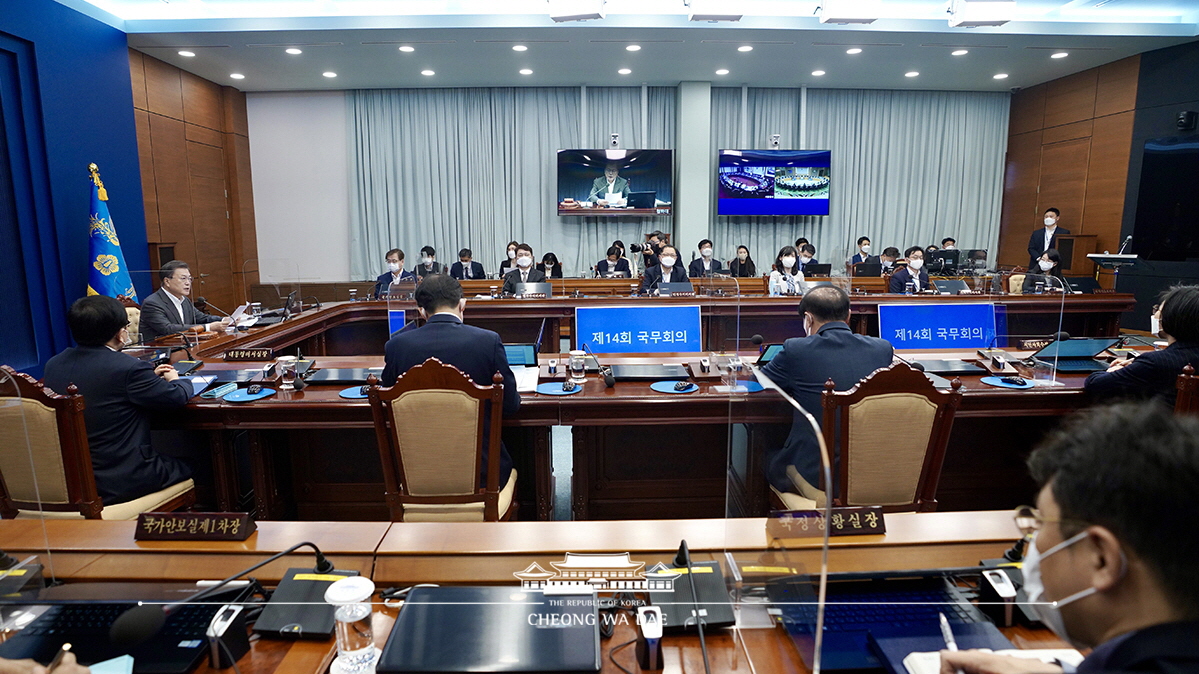이 웹사이트는 제19대 대통령 임기 종료에 따라 대통령기록관이 「대통령기록물 관리에 관한 법률」에 의해 이관받아 서비스하는 대통령기록물입니다. 자료의 열람만 가능하며 수정 · 추가 · 삭제는 불가능합니다.
다만, 「개인정보보호법」에 의하여 개인의 정보를 보호받기 원하시는 분은 관련 내용(요청자, 요청내용, 연락처, 글위치)을 대통령 웹기록물 담당자(044-211-2253)에게 요청해 주시면 신속히 검토하여 조치해 드리겠습니다. 감사합니다.
SPEECHES & REMARKS
BRIEFINGS

Our economy is making a rapid and strong turnaround. Many international organizations have repeatedly revised their forecasts upward for Korea’s economic growth rate this year. Among them, the IMF has raised its projection of Korea’s growth by half a percentage point to 3.6 percent. As a matter of fact, our economy is recovering to its pre-COVID-19 level as seen in continued increases in exports, the expansion of investments and an improvement in the consumer sentiment index. These indicators are lifting expectations that both exports and domestic demand will grow. The Government will optimize this trend even more and hasten economic recovery to the maximum extent possible. At the same time, we will put our hearts and souls into an inclusive recovery that minimizes the inequality caused by the COVID-19 pandemic.
The supplementary budget drawn up this time will also contribute to an inclusive recovery. I ask everyone to make extraordinary efforts to ensure that the fourth round of emergency relief payments, including the business support funds for the self-employed and the emergency employment stability funds to preserve jobs, are given out as soon as possible and that newly added support funds for farmers and fishermen are disbursed promptly as well.
The COVID-19 situation is still precarious. Current epidemic prevention and control is bound to have direct bearings on the economy. For this reason, I urge you to do everything possible to maintain thorough anti-epidemic measures. The administering of COVID-19 vaccines for the general public will start in April. Accordingly, vaccination priorities should be fairly determined in detail, and inoculations should be sped up.
Today, we will make a decision about the Interest Limitation Act and the Credit Business Act’s enforcement decrees to cap the legal maximum rate at 20 percent. Since the inauguration of my Administration, the maximum interest rate had been cut from 27.9 percent to 24 percent, and it will be lowered further this time. I am very pleased to see that another administrative priority made as a promise to the people has been fulfilled. Above all, the interest burden on 2.08 million debtors with high-interest loans will be significantly reduced. In particular, I expect this cut to be of direct help to low-income earners who resort to high-interest, short-term loans and microcredit for day-to-day living.
The Government will implement multifaceted follow-up measures to ensure that the benefits from the reduced maximum interest rate are evenly distributed and the effect of the policy is maximized. As the cut cannot be applied retroactively, there are people who cannot benefit from it even though they are meeting payments on such high-interest loans. For them, we will provide a total of 300 billion won by the end of next year to offer as many alternative loan products as possible with interest rates below 20 percent. We will also lower interest rates on the leading state-backed financing program for low-income households, the “Sunshine Loan,” from 17.9 percent to 15.9 percent, and its interest rate will be cut further for those who have been repaying faithfully.
Banks and credit card companies are now planning to launch new state-backed microfinance products for the working class. I look forward to these institutions helping those who face difficulties when applying for loans or credit cards by launching the “Sunshine Loan Bank” and “Sunshine Loan Credit Card.” Meanwhile, efforts to eradicate illegal private financing will be further enhanced.
To reduce financial burdens on low-income earners and the vulnerable, the Government has strongly pursued “inclusive” financial policies such as lowering interest rates, rescheduling debts and limiting the additional interest applied to delinquent payments. In particular, the supply of state-backed microfinance for the less privileged was significantly increased to 25 trillion won over the past three years and benefited a total of 2.13 million people. Thanks to such steady efforts, the number of defaulters on financial debts considerably dropped from over 940,000 at the end of 2017 to around 800,000 last February. Considering that the achievement was made amid the COVID-19 crisis, it can be said that finance has effectively played its vital role in safeguarding the lives of low-income earners.
Over the past year, finance has greatly contributed to sustaining those imperiled by this crisis. In addition to fiscal injection, the Government has made all-out efforts to surmount the economic crisis by employing financial support measures worth more than 175 trillion won. Of note, we did our utmost to prevent the hardships facing microbusiness owners and SMEs from growing by extending loan due dates and deferring repayment. I am deeply grateful for the active role played by financial authorities and the cooperation from the financial sector. I ask you to do all you can to further broaden the base of inclusive finance so that finance can continue to be a safety net for people in need going forward.
Thank you.



